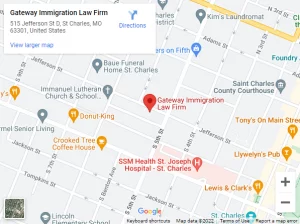Understand the Rights and Responsibilities of Permanent Residents
Summary: Understanding the rights and responsibilities of permanent residents is crucial for a successful and secure life in the United States. Gateway Immigration Law Firm in St. Charles, MO, offers expert legal assistance in comprehending and adhering to the complexities of immigration law.
Being a permanent resident of St. Charles, MO, has life-changing rights and duties. You need to know permanent resident rights and duties St Charles MO or hire a lawyer to comprehend immigration law. This helps permanent residents avoid deportation from the US.
Gateway Immigration Law Firm can help you preserve permanent residency. Our expert attorneys help explain St. Charles, MO’s complex permanent resident rights and duties. Contact us today to discuss your problem.
Who is a Permanent Resident?
Legal permanent residents in St. Charles, MO, are those who have been given permanent residency. A green card allows a person to live and work in St. Charles, MO, or elsewhere in the country without restrictions.
Social advantages including healthcare and education are available to permanent residents who work and study in the U.S. But they can’t vote in federal elections. Family-sponsored immigration, employment-based sponsorship, refugee or asylee status, and other humanitarian initiatives lead to permanent residency.
What is the Process For Applying For Permanent Residency?
The St. Charles, MO, permanent residency application process follows U.S. immigration laws. Beginning with family links or work, people choose their eligibility.
An individual, family member, or employer must submit a petition for permanent residency. If the petition is authorized by United States Citizenship and Immigration Services (USCIS), the petitioner can proceed with consular processing if they are outside the U.S. or adjustment of status if they are already here. The last step is receiving a green card, granting permanent residence status.
What is the Difference Between a Permanent Residency, Citizenship, and a Visa?
Permanent residency, represented by a green card, allows people to live in the U.S. legally and enjoy many citizen privileges, save voting.
Citizenship, representing the highest legal status, grants full civic engagement, including voting and public office. Path to citizenship frequently requires residency, examinations, and US commitment.
Work, study, and other visas grant temporary authorisation. Visa holders in St. Charles, MO, as in the U.S., have rights based on their purpose of stay, such as job or school. Visa holders must follow visa rules and have a restricted stay, unlike permanent residents and citizens.
Types of Permanent Residency
In the United States, there are several types of permanent residency, each with its own eligibility criteria and application processes. Here are some of the main types:
- Family-sponsored Green Cards: Immediate Relatives: For spouses, unmarried children under 21, and parents of U.S. citizens.
- Family Preference Categories: For more distant relatives, including unmarried sons and daughters of U.S. citizens, spouses and unmarried sons and daughters of permanent residents, married sons and daughters of U.S. citizens, and siblings of U.S. citizens.
- Employment-based Green Cards:
- EB-1: Priority Workers, including persons with extraordinary abilities, outstanding professors and researchers, and multinational executives and managers.
- EB-2: Professionals with advanced degrees or exceptional abilities.
- EB-3: Skilled workers, professionals, and other workers.
- EB-4: Special Immigrants, such as religious workers, certain international broadcasters, and employees of U.S. foreign service posts.
- Diversity Visa (DV) Lottery: The Diversity Visa Program, also known as the green card lottery, is a program that provides a limited number of green cards through a random lottery to individuals from countries with low rates of immigration to the U.S.
- Refugees and Asylees: Individuals granted asylum or refugee status can apply for permanent residency after meeting certain requirements.
- Special Programs: There are various special programs that may lead to permanent residency, such as the Cuban Adjustment Act, the Haitian Refugee Immigration Fairness Act, and certain provisions for battered spouses or children of U.S. citizens or permanent residents.
- Registry: Registry is a program for people who have been present in the U.S. since January 1, 1972, and who are otherwise ineligible for other types of permanent residency.
- Human Trafficking and Crime Victims: Certain victims of human trafficking and other crimes may be eligible for permanent residency through the T or U visa programs.
- Returning Resident (SB-1) Status: This is for permanent residents who have stayed outside the U.S. for an extended period and need to return.
- Parole in Place: This program is for certain family members of U.S. military personnel, veterans, and enlisted members in the Selected Reserve of the Ready Reserve.
Rights of a Permanent Resident
In the United States, permanent residents generally have the following rights:
- Right to Live and Work: Permanent residents have the right to live and work in the U.S. on a permanent basis.
- Legal Protection: They are entitled to legal protection under U.S. law and the Constitution.
- Education: Permanent residents have access to education at all levels.
- Social Security and Medicare: They may be eligible for Social Security benefits and Medicare after meeting certain conditions.
- Property Ownership: Permanent residents can own property in the U.S.
- Freedom of Movement: They can travel freely within the United States but may need special documentation for international travel.
- Freedom from Deportation: While they are not citizens and may not have all the same rights, they are generally protected from deportation unless they violate certain immigration laws.
Responsibilities of a Permanent Resident
Permanent residents in the United States, and generally in most countries, have certain responsibilities that they are expected to fulfill. These responsibilities include:
- Obeying Laws: Permanent residents are required to follow all federal, state, and local laws in the country they reside in.
- Filing Taxes: Permanent residents are obligated to file federal and state income taxes and report their worldwide income.
- Selective Service Registration: Male permanent residents between the ages of 18 and 26 are required to register with the Selective Service System.
- Maintaining Permanent Residence: Permanent residents should maintain their permanent resident status and carry evidence of their status, usually in the form of a green card.
- Not Engaging in Criminal Activities: Permanent residents should avoid engaging in criminal activities that could lead to their arrest, conviction, and potential deportation.
- Informing USCIS of Address Changes: Permanent residents must inform the U.S. Citizenship and Immigration Services (USCIS) of any changes in their address within a specified period.
What Happens if I Fail to Fulfill My Responsibilities as a Permanent Resident?
Deportation may result from failing to perform certain responsibilities, notably those related to criminal activity or immigration law infractions. If you’re unsure of criteria or your status, call an immigration attorney. They can advise you on your individual circumstances and help you comply with Missouri and federal immigration rules.
Consult With Us About Permanent Resident Rights and Responsibilities St Charles MO
Becoming a permanent resident in St. Charles, MO, is a big step, and it’s important to understand your new rights and responsibilities. Contacting an experienced immigration lawyer from Gateway Immigration Law Firm is crucial for understanding the specific rights and responsibilities associated with becoming a permanent resident in St. Charles, MO.
We can guide you through the process, providing valuable insights to help you maintain your permanent residency status and avoid potential issues. Call us today to discuss your situation.







